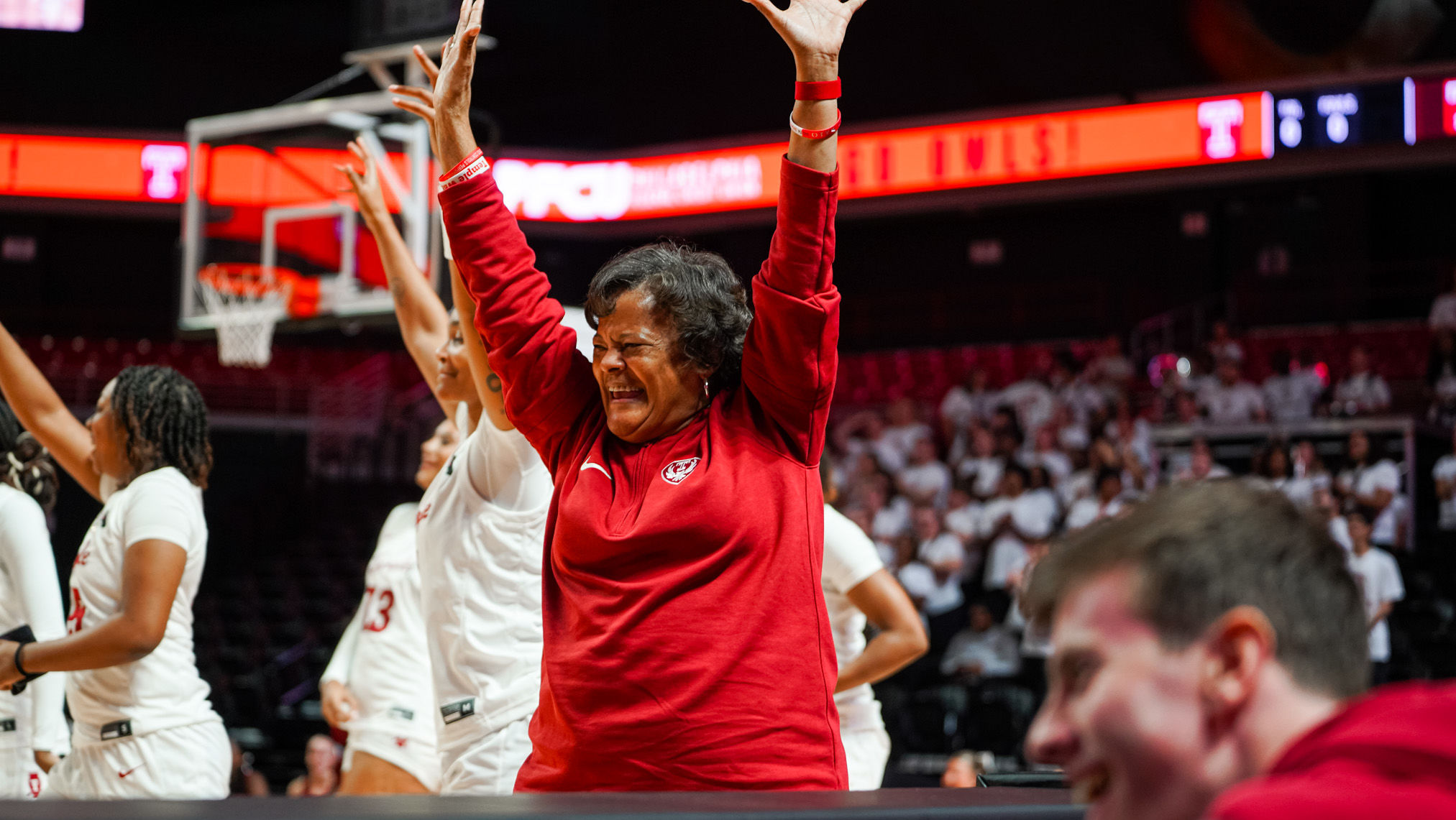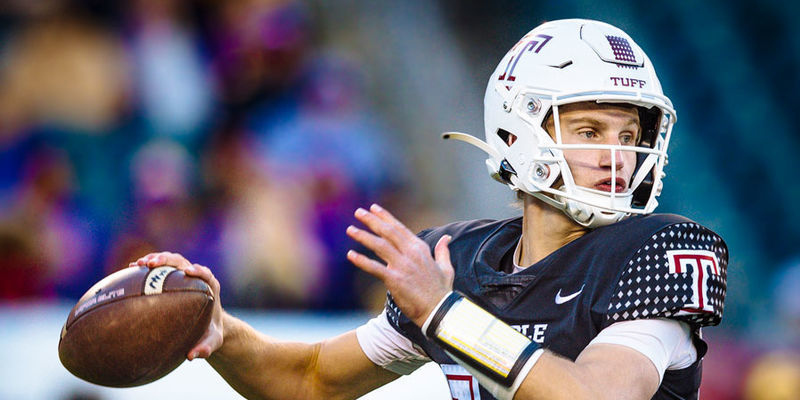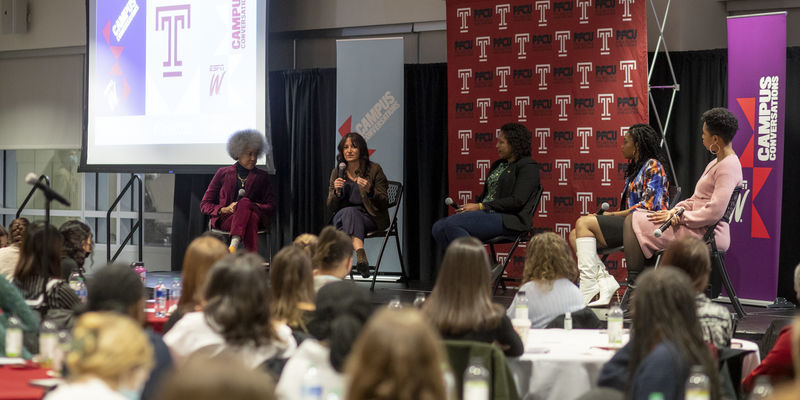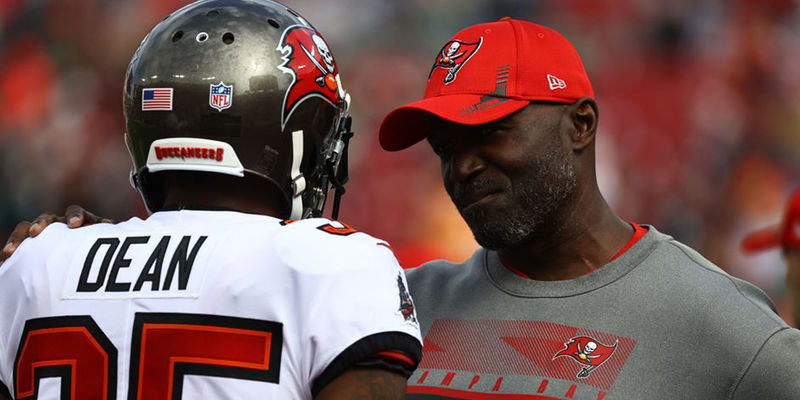Temple Coach Diane Richardson’s impact goes beyond basketball
Get to know Coach Diane Richardson, who is entering her second season as the Temple Owls women’s basketball head coach.

When Diane Richardson was named head coach for the Temple Owls women’s basketball team last year, she described her proudest moment as being hand-picked as one of 50 chosen leaders in Heroes, Leaders and Legends, a book co-written by Oprah Winfrey that shares stories of the most influential mentors in history.
Her leadership skills are part of what made her such an ideal fit for the coaching job at Temple. Before arriving on North Broad Street, she led Towson University to a record-breaking 2021–2022 season and the school’s second berth in the Women’s National Invitation Tournament in school history.
The first in her family
A native of Washington, D.C., Richardson comes from humble beginnings, as she grew up in the inner city, her older brother the only one in her family to receive a high school diploma. In addition to becoming the second in her family to graduate from high school, she was the first in her family to attend college by earning a basketball scholarship to Frostburg State University. She can partially thank her brother for that, as he played basketball with her to help make her scholarship dream a reality.
“[Earning a scholarship] gave my family the belief that college was now attainable. My two younger sisters went on to attend college, and my mother received a bachelor’s degree, graduating with honors,” Richardson said. “Breaking that cycle changed my outlook on life and opened many other doors.”
Richardson was a multistar athlete in college and became the NCAA regional field goal percentage leader during her first year at Frostburg State University. In 1979, she was NCAA regional champion in the 200- and 400-meter races, which earned her a spot on 1980 U.S. Olympic team.
She had always wanted to be a child psychologist, and she graduated with a bachelor’s degree in psychology and sociology. However, unable to find a job in child psychology after graduating, she began working her way up the ranks at banks, where she had worked part time in the summers. She earned her master’s in finance and management from Central Michigan in 1984.
She developed an extensive business career working in the financial services field and founded an investment firm, American Security Corporations, where she worked for about 20 years before selling the company. She also became vice president of the National Neighborhood Lending Marketing Team for Bank of America and chief executive officer and president of RCI Financial for several years.
Together with her husband, Larry, they started donating money through programs for young girls in the inner city to participate and travel in Amateur Athletic Union (AAU) basketball tournaments.
“I felt strongly about how sports changed my life. After I went to a few AAU practices, I thought, wow, this is what I remember about playing basketball and having relationships with the coaches,” she said. “It instantly piqued my interest, and I ended up coaching an AAU team for the summer.”
That then led to her first assistant coaching job at Fairmont Heights, an inner-city school in Maryland. Eventually she was recruited as an assistant coach for the women’s basketball team at Riverdale Baptist School High School in Upper Marlboro, Maryland, and was promoted to head coach after one month. During Richardson’s tenure, she led the team to five National Championships and was ranked in USA Today’s Top 10 in five of her eight years.
“I just loved the relationships I had with the young ladies toward building their confidence,” she added. “I thought coaching could change some children’s lives.”
'I feel happy, healthy, terrific'
Off the court, Richardson has raised her own three children, Dana, Donnie and Michael, the youngest of whom is on the autism spectrum. Additionally, Richardson adopted WNBA All-Star Jonquel Jones as a child at the age of 13 from the Bahamas.
Dana, the oldest child at 37, was diagnosed with cerebral palsy at 10 months old. Doctors told Richardson that Dana would never be able to eat regular foods, move her limbs or understand anything.
“The doctors suggested putting Dana in a state home because she would bring us heartache,” Richardson explained. “However, my husband and I prayed about it, chanted positive affirmations to her, stayed the course and raised her. She really changed our lives and how we approach things because we were incredibly positive and prayerful throughout her life.”
Dana, as an infant, was unable to move her limbs and could only be fed baby food. However, Richardson started to chant, “I feel happy, healthy, terrific,” and then clapped to Dana every morning in her room. At age 2, Dana began clapping her hands whenever they turned on the light in the room. At 7 years old, she gained enough strength to take her first steps. At age 12, she participated in races in the Special Olympics.
“She doesn’t talk, but she went from the doctors saying she would never do anything to participating in activities, eating regular food and understanding what we are saying,” Richardson said.
Building a new culture
Richardson manages to strike the perfect balance between establishing time to be present for both her family and players. Her coaching philosophy is to empower her players by encouraging them to be themselves as individuals who work together. She described herself as a “night owl” who spends evenings with her family, and then studies film and engineer game strategies every night from 10 p.m. to 2 a.m.
“My husband has always been supportive of my coaching. We both have encouraged our children through the challenges that life throws at them. That's how I am as a coach, trying to instill confidence in my young ladies in a way that’s not only going to help them in basketball but also in life,” she added. “I meet them where they are at.”
When Richardson started as head coach at Temple, the team only had six players, so she had to recruit the rest through the transfer portal.
“We had to create a new culture, so in the beginning, we were trying to figure out how to play together,” she said. “And toward the end of the season, we could see the team bonding. It was surprising to see us grow so fast.”
Richardson dedicates about 80 hours a week to coaching, including traveling, practices, games and studying game films. And in the offseason, 40 hours a week is focused on recruiting. For one week this summer, she was recruiting a player in Amsterdam, and packed her bags to meet with a player in Lubbock, Texas, the following week.
“We are always recruiting, so I and other coaches split the time,” she said. “We also have official visits set up with players and their parents to introduce them to our beautiful campus.”
Richardson also created a program called Hoops and Heels, where professional women mentor the players on the team. The players participate in a seminar during practice time every month, discussing career pathways, and are informed about internships and job opportunities.
At the conclusion of year one under Richardson, the Owls finished with a record of 11-18. With a revamped team going into this season, she is optimistic the team can build off last year’s record.
“I know we all have it in us. Our players have already shown improvement from last year,” she said. “You want to win, but my underlying goal remains to give the players confidence on and off the court. I want to ensure they’re on the right path to achieve their goals by giving them the resources they need to carry that out. More importantly, it’ll help them in life.”


